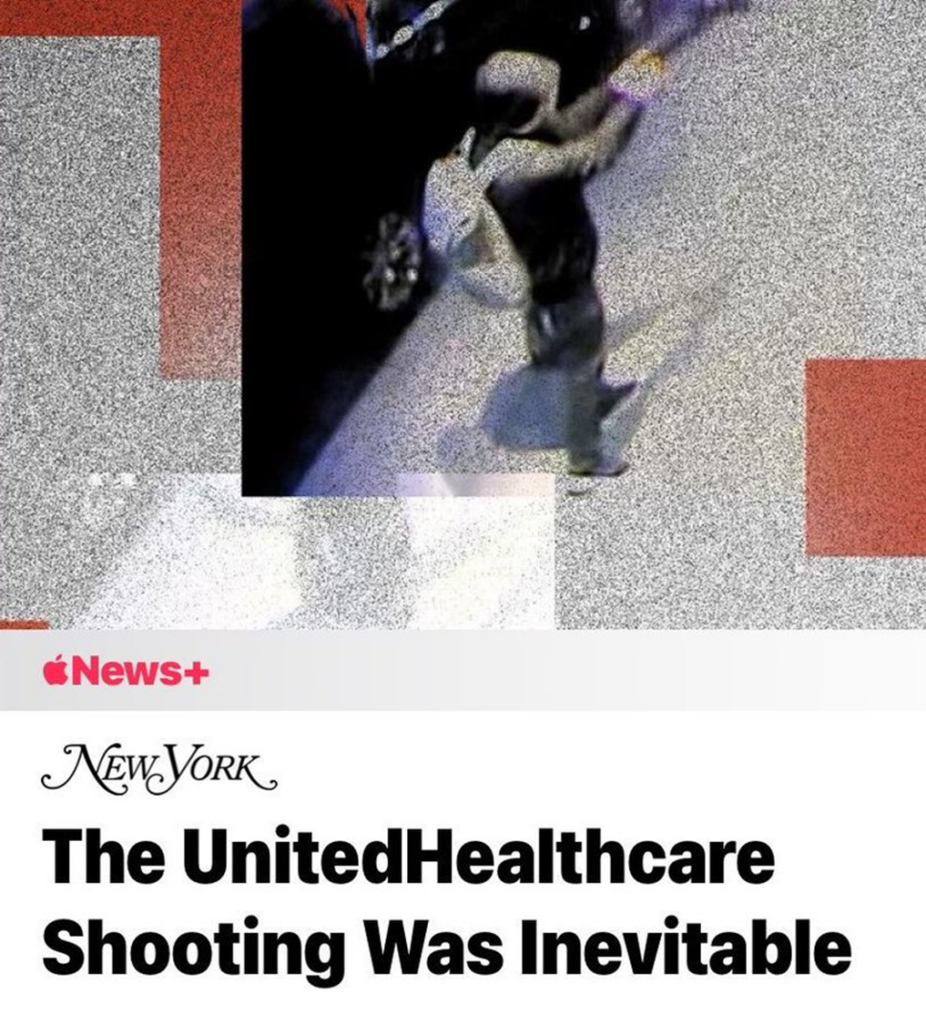I don’t normally dive into opinions or commentaries on things like what happened last week, but man…I have been feeling off. Others I’ve talked to in the industry feel similarly dismayed and jaded by the public’s response to this event, and I feel as if I need to get some thoughts off my chest.
A man died last week.
He was assassinated on a sidewalk in downtown Manhattan at 7am. A family lost a husband and a father in cold, brutal fashion.
It sparked a flurry of conversation. I saw some notes of support, encouragement, sympathies.
But then I noticed shocking posts shared online, containing abhorrent stuff. Like a poll questioning whether he deserved it, a majority of respondents answering ‘yes,’ along with some…off-color headlines from traditional media players day-of I was not expecting.
A non-zero number of people are celebrating an objectively cruel act as a win against health insurance, claiming it was deserved. This sensationalism, these posts, the assassination itself…these things are not the way to invoke change, fam. I can’t believe I even have to type that out. There’s a better path forward, and it doesn’t involve the deaths of insurance executives.
It’s okay to call out bad actors and abuses in healthcare. The business of health insurance (ahem…the business of healthcare) is rampant with them, and needs significant improvement. We’ve seen countless stories of unfair denials driven by AI, or shady business practices leading to delayed care. People are perfectly valid in calling out problematic practices in healthcare – whether that’s from insurance, life sciences, hospitals, physicians, private equity, or any other stakeholder within.
But no, a man does not deserve to die for any of the above – it’s a false equivalency:
- Thompson’s Death: A tragic and unjustifiable act of violence that raises questions about the role of public outrage and its consequences.
- Health Insurance Practices: A systemic issue requiring reform to ensure patient well-being and ethical accountability.
I get it. People are angry. When you hear about systemic issues, like patients suffering or dying because of corporate decisions, it’s easy to feel like someone deserves to pay for that. But let’s slow down for a second and unpack this. Anger at the system is valid, but targeting an individual with violence doesn’t fix the system – it just adds another tragedy to the pile.
Even if you truly believe Brian Thompson was personally responsible for harmful policies, what does killing him achieve? It doesn’t bring justice to the patients who were harmed, it doesn’t change the policies, and it certainly doesn’t dismantle the system that allowed those policies to exist. All it does is perpetuate a cycle of violence and distract from the actual work of holding these companies accountable.
Conflating justice with vengeance just muddies the water. If we want to change the system, we’ve got to stay focused on solutions that don’t make us complicit in the same kind of harm we’re fighting against. We’ve got to be better than the system we’re trying to fix.
The real power we have is in changing the rules of the game. Shifting the paradigm.
That means…
- Pushing for regulatory reforms;
- Supporting whistleblowers where appropriate;
- Exposing unethical practices; and
- Creating a more open, transparent discourse around what’s actually happening in healthcare.
It also means stepping away from bullshit marketing fluff. Ending the unceasing angry mob crying foul about the same high level issues we’ve been complaining about since the dawn of time (and allowing grifters to build audiences in the process). More transparency means better data. Better reporting and understanding of how healthcare silos interact. Holding stakeholders accountable. And within your own organizations…having some integrity to do the right thing in the first place to restore public trust in healthcare institutions.
On the Role of Health Insurance
This essay isn’t a defense of health insurance. You guys know I’m generally on the provider side of the equation! But I also try to recognize nuance and gray areas as much as possible to understand how the system works. And there’s a simple truth in our system today: someone has to be the gatekeeper – the villain, more or less. Health insurance holds this role, and they get trashed for it – by providers, patients, and the media (and don’t get me wrong – justifiably so in many instances). Some of the stuff insurers have done on the denials front is indefensible and scummy. There’s no doubt about that. But health insurance as counteracting force needs to exist in some capacity. We can differ in opinion on what the scope of that role is, and what should even be covered.
Still, whether by the government or private entities, checks and balances will never go away – and therefore neither will insurance games with patients and providers. Health insurance in any capacity works with finite resources, and they have to (ethically) weigh rising drug costs, hospital prices, flag overutilization or unnecessary care, balancing input costs all while trying to prove they’re still valuable to employers or the government. And they have to do so without truly, actuarially measuring a patient’s risk.
Join the thousands of healthcare professionals who read Hospitalogy
Subscribe to get expert analysis on healthcare M&A, strategy, finance, and markets.
No spam. Unsubscribe any time.
I asked a colleague to write up their thoughts on the current situation and tend to agree with this line of thinking. It holds some uncomfortable truths about healthcare, and I welcome your feedback in the replies.
The United States at its core has a healthcare price problem. Ignore the administrative costs. Ignore the higher median per capita utilization. The United States pays higher prices for everything it “consumes” (whether that be drugs, hospital admissions, testing, and more.) United States physician incomes are the highest in the world – as are every other professional service including lawyers, bankers, engineers – so we can’t fixate on that.
At the bottom line, there are a litany of variables contributing to this outcome but ignoring its reality is just plain ignorant. The ACA addressed one of our country’s greatest shortcomings – healthcare access. But that access came at cost… Why did preexisting condition denials exist in the first place? It probably had to do with how costly these patients were to treat. When you decide to cover expensive things (like preexisting conditions) everyone else in the risk pool must pay more (this is why premiums and out of pocket costs have exploded higher since the ACA)…
Anyway, because of the fragmented nature of the US Healthcare system, UnitedHealth Group is probably the only entity large (and sophisticated) enough to push back on price. The fact that healthcare system executives and surgeons fear UNH above everyone else (not named CMS) signals to me they are doing their job. Until we address the 80/20 reality in healthcare expenditure healthy people are going to revolt and sick people are going to pick up the tab.
We want American healthcare access at European prices. Good luck with that. European prices are cheaper because they lack American access… Nobody seems to want to accept rudimentary math anymore.
TL;DR – tradeoffs are required.

On Healthcare’s Malignant Discourse
Some of the headlines and reactions I read on the day of the shooting from reputable news sources or individuals this week were upsetting.
You might not find issue with the headline below, but I found it – and others like it – to be off-color. The coldhearted tone is palpable throughout these pieces, and healthcare media has done our industry a disservice this week by fanning the flames of evil behavior and making out every executive in the industry to be some nefarious figure.


Healthcare media has really dropped the ball by constantly pushing cynical takes on business instead of offering a fair look at the challenges and realities of running a company in a capitalist system. If we want executives to engage with us, this isn’t the way to do it—this just pushes them further into their ivory towers, behind iron curtains, and away from the conversation (or on lockdown, as many currently are). Right now, the way we talk about these issues only fuels hostility and division, and in the end, that costs all of us. Instead of offering constructive solutions and balanced perspectives within those articles, we’re spending money on security and fences. Isn’t it time to rethink how we approach this?
Investigative journalism – and accountability – is needed in healthcare, and is an important role to play across industries. This fact is absolutely true, and reporters everywhere do a great job of digging up the dirt on shady business tactics in healthcare and beyond. The public needs to be informed of bad actors and failures/breakdowns in the system, manipulation of regulation, and abuse.
But the same media outlets who cry foul about healthcare companies putting profits over patients…also sought financial gain from another’s suffering this week. They failed this week in a big mainstream moment for the industry.
An act of terror =/= health insurance inefficiency. Hope that helps.
I’m saddened and bummed by the state of things, and the insane reaction to this event. We have a long way to go, but let’s start picking up the pieces today. Today I challenge you to look beyond your own healthcare tribe, break down your silo, and come to the table in a posture of humility.
- How can we best engage in thoughtful discourse and invoke meaningful change – without normalizing terrorist behavior? How can individuals or organizations practically contribute to these efforts?
- What reforms are needed TODAY, even if it doesn’t benefit your organization? (site neutral, prior auth, 340B, etc.)
